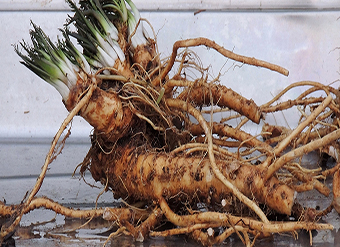
Horseradish: A Culinary Revival.
- Food Science
While horseradish is undergoing a culinary revival, its biomedical research is producing some amazing results. The University of Illinois has identified that glucosinlates (yes the same enzymes that produces mustard oil when the root is scraped) have anti-cancer properties. These compounds, also found in cruciferous vegetables such as broccoli, cabbages and brussels sprouts - all part of the horseradish family - increases the body’s ability to detoxify cancer-causing compounds and suppress cancer growth in the body.
Horseradish peroxidase, another enzyme, is used as an anti - body test for HIV/AIDS and the highly contagious SARS virus. Research at the respected Massachusetts Institute of Technology, claims that this same enzyme also removes a number of pollutants from waste water. While more research needs to be conducted before new horseradish medicines and environmental solutions shape our lives, there is no doubting that Mother Nature provides for us. The greatest challenge for mankind this century is to discover what and how she has provided and to respect her wisdom.
The heart of Michael Pollan’s message in his book, In Defence of Food, is that we must return to eating a balanced wholesome diet by eliminating highly processed and manufactured super foods. He argues that “nutritionalism” and designer foods; edible food-like substances that have been injected with nutrients are not the path to health and well being. Rather we need to eat a diet rich in plants.
Horseradish is not a miracle food, because this concept is just more marketing hype. But is it rich in Vitamin C and Vitamin K and contains iron, sulphur, magnesium, potassium, calcium and sodium. This humble herb stimulates the appetite, improves liver function and aids digestion. It has antibacterial properties and can lower fever by increasing perspiration; it is a diuretic and stimulates blood circulation. Eating natures gifts and enjoying the sheer pleasure of eating fresh and healthy food enriches our lives and palates. Perhaps now we are just beginning to realise the insight of the Oracle at Delphi who told Apollo “that radish was worth its weight in lead, the beets its weight in sliver, and the horseradish it weight in gold.
